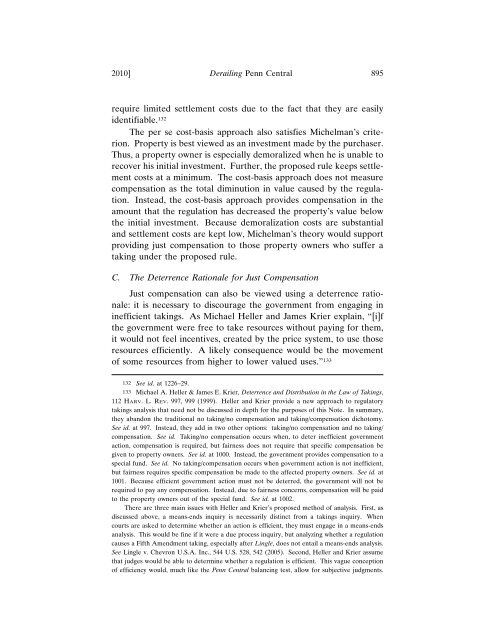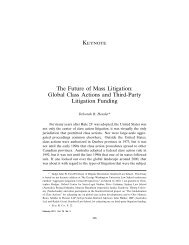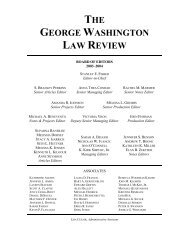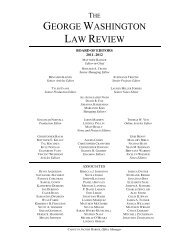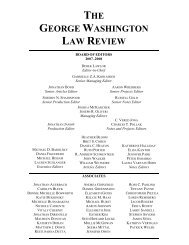View PDF - The George Washington Law Review
View PDF - The George Washington Law Review
View PDF - The George Washington Law Review
Create successful ePaper yourself
Turn your PDF publications into a flip-book with our unique Google optimized e-Paper software.
2010] Derailing Penn Central 895<br />
require limited settlement costs due to the fact that they are easily<br />
identifiable. 132<br />
<strong>The</strong> per se cost-basis approach also satisfies Michelman’s criterion.<br />
Property is best viewed as an investment made by the purchaser.<br />
Thus, a property owner is especially demoralized when he is unable to<br />
recover his initial investment. Further, the proposed rule keeps settlement<br />
costs at a minimum. <strong>The</strong> cost-basis approach does not measure<br />
compensation as the total diminution in value caused by the regulation.<br />
Instead, the cost-basis approach provides compensation in the<br />
amount that the regulation has decreased the property’s value below<br />
the initial investment. Because demoralization costs are substantial<br />
and settlement costs are kept low, Michelman’s theory would support<br />
providing just compensation to those property owners who suffer a<br />
taking under the proposed rule.<br />
C. <strong>The</strong> Deterrence Rationale for Just Compensation<br />
Just compensation can also be viewed using a deterrence rationale:<br />
it is necessary to discourage the government from engaging in<br />
inefficient takings. As Michael Heller and James Krier explain, “[i]f<br />
the government were free to take resources without paying for them,<br />
it would not feel incentives, created by the price system, to use those<br />
resources efficiently. A likely consequence would be the movement<br />
of some resources from higher to lower valued uses.” 133<br />
132 See id. at 1226–29.<br />
133 Michael A. Heller & James E. Krier, Deterrence and Distribution in the <strong>Law</strong> of Takings,<br />
112 HARV. L. REV. 997, 999 (1999). Heller and Krier provide a new approach to regulatory<br />
takings analysis that need not be discussed in depth for the purposes of this Note. In summary,<br />
they abandon the traditional no taking/no compensation and taking/compensation dichotomy.<br />
See id. at 997. Instead, they add in two other options: taking/no compensation and no taking/<br />
compensation. See id. Taking/no compensation occurs when, to deter inefficient government<br />
action, compensation is required, but fairness does not require that specific compensation be<br />
given to property owners. See id. at 1000. Instead, the government provides compensation to a<br />
special fund. See id. No taking/compensation occurs when government action is not inefficient,<br />
but fairness requires specific compensation be made to the affected property owners. See id. at<br />
1001. Because efficient government action must not be deterred, the government will not be<br />
required to pay any compensation. Instead, due to fairness concerns, compensation will be paid<br />
to the property owners out of the special fund. See id. at 1002.<br />
<strong>The</strong>re are three main issues with Heller and Krier’s proposed method of analysis. First, as<br />
discussed above, a means-ends inquiry is necessarily distinct from a takings inquiry. When<br />
courts are asked to determine whether an action is efficient, they must engage in a means-ends<br />
analysis. This would be fine if it were a due process inquiry, but analyzing whether a regulation<br />
causes a Fifth Amendment taking, especially after Lingle, does not entail a means-ends analysis.<br />
See Lingle v. Chevron U.S.A. Inc., 544 U.S. 528, 542 (2005). Second, Heller and Krier assume<br />
that judges would be able to determine whether a regulation is efficient. This vague conception<br />
of efficiency would, much like the Penn Central balancing test, allow for subjective judgments.


